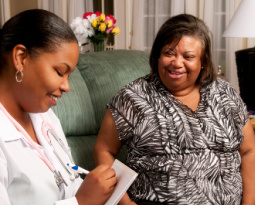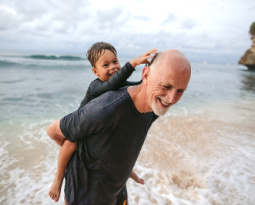The patient
Ms. D was a 30-year-old married woman with 2 children; pregnant with her third child.
Patient’s situation
Ms. D has a medical history of ulcerative pancolitis, leading to diarrhoea (sometimes with bloody stools), malabsorption, weight loss, a reduced appetite and fatigue. Her pre-pregnancy weight was 46 kg and on referral her weight was 48.5 kg, giving her a BMI of 16.2 kg/m2. Her first 2 children were small for gestational age.
Ms. D was referred to the Maternity Dietetic Services Manager by the local Community Dietitian, who had already advised the patient to follow a low residue diet and take a polymeric oral nutritional supplement (ONS), which Ms. D had been prescribed in previous pregnancies.
On initial assessment, Ms. D’s ONS prescription was changed from a polymeric ONS formula to Vital 1.5kcal, a peptide-based oral nutritional supplement, rich in medium-chain triglycerides. Four weeks later, Ms. D had gained 5.1 kg, reaching 53.6 kg at 22 weeks. Foetal weight gain was excellent. Ms D’s weight continued to increase throughout pregnancy and at final follow up at 38 weeks of gestation, Ms. D weighed 64.5 kg, having experienced a total pregnancy weight gain of 16.9 kg.
Nutritional Intervention
2 x 200 ml bottles Vital 1.5kcal daily – to take as needed as dietary intake was erratic and varied daily.
Nutritional Intervention Goals
- Optimal nutrition for mum and baby to support maternal and foetal weight gain and foetal growth
- Meet energy and protein needs during pregnancy
- Reduce malabsorption and risk of malnutrition
Patient Outcomes
Ms. D experienced good weight gain during her pregnancy of 16.9 kg, which is in line with recommendations. There was some improvement in diarrhoea and taking an ONS also seemed to improve her appetite. Baby also had excellent weight gain and growth.
Ms. D said, ‘Vital 1.5kcal is the only ONS drink I have been able to tolerate. During my pregnancy this time, my appetite was better and I had more energy compared to when I took other ONS drinks in my previous pregnancies’.
Economic impact outcomes
Small for gestational age babies are more likely to experience poor health outcomes in later life, impacting NHS costs. In this case, baby was born at a good weight, being on the 80th centile for weight. He was not small for gestational age, unlike Ms. D’s first two children.





Stay Connected